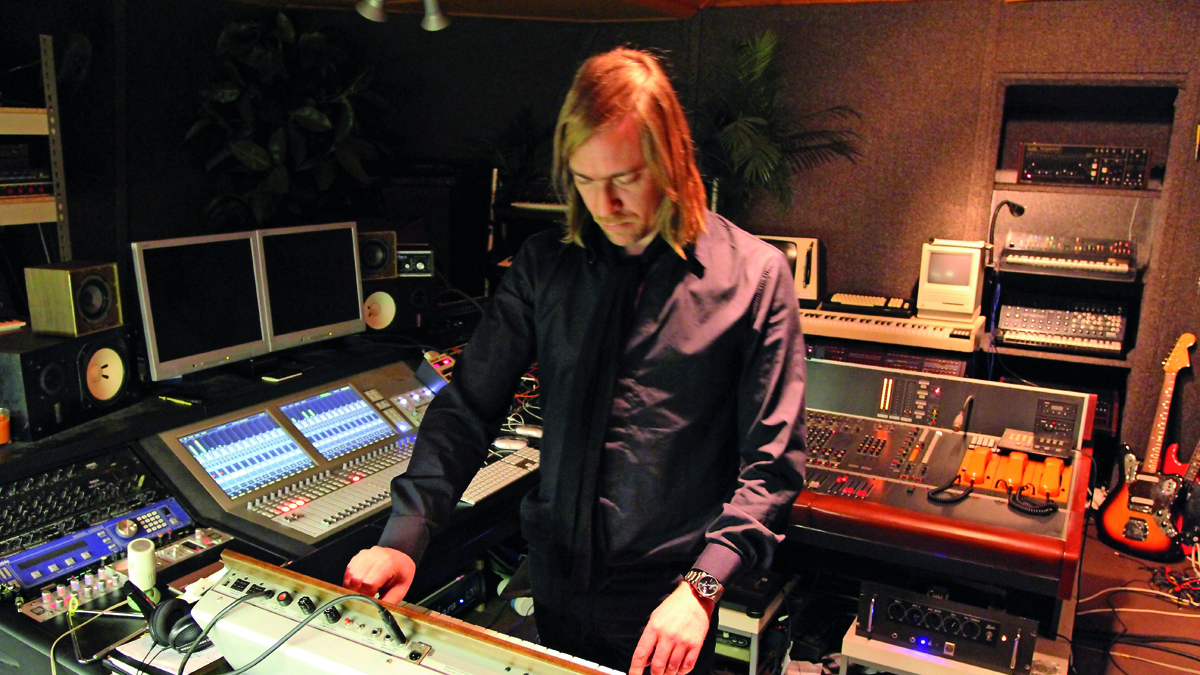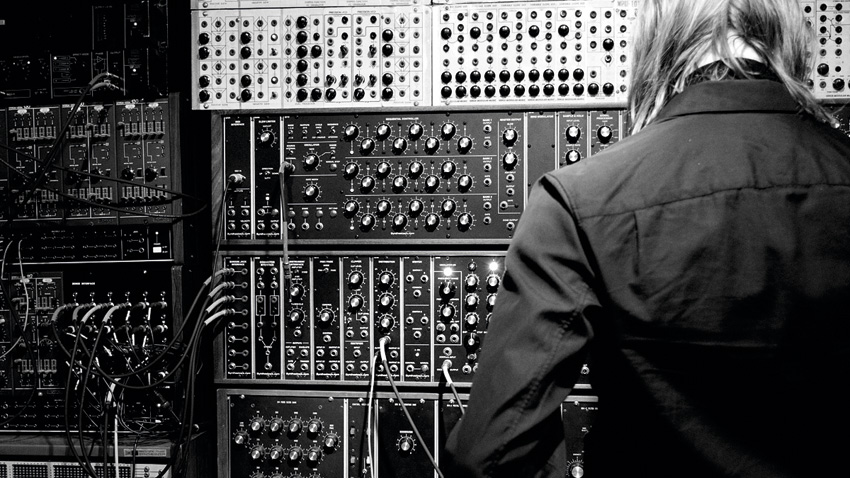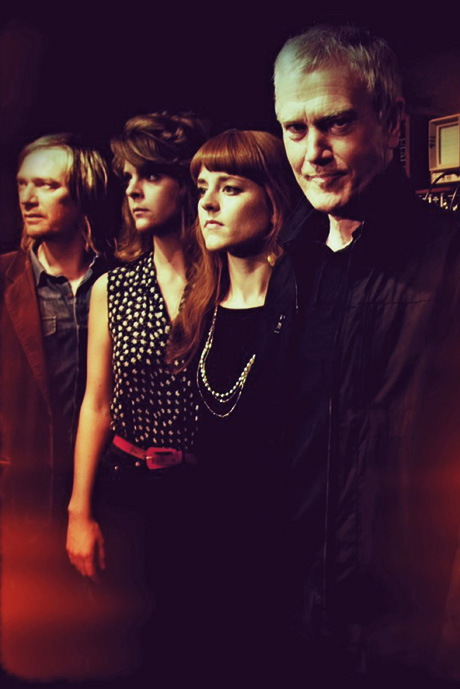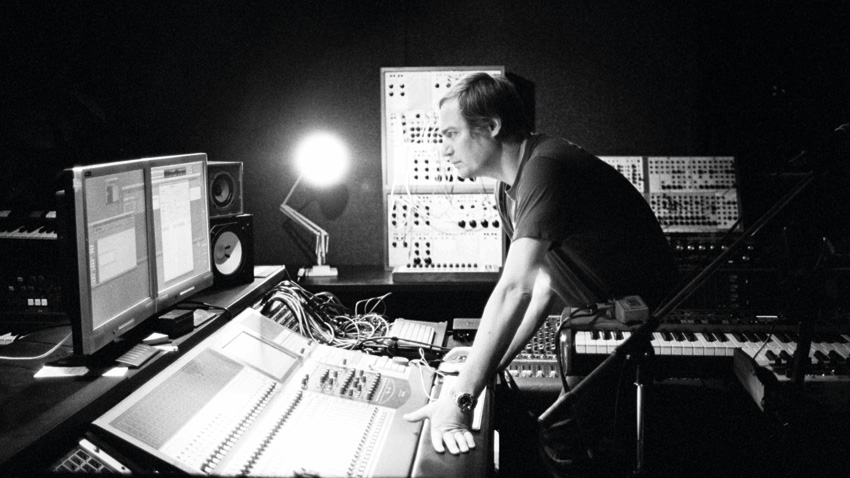Benge is taking his synths back to the future
What do you get from a life obsessed with synths? A wealth of musical mastery and a massive collection of mouthwatering gear

The first thing that hits you as you walk into Ben Edwards' East London studio is the smell. A warm, sweet, slightly dusty smell of transformers, resistors, transistors and cracked PCBs. The unmistakable smell of analogue.
Edwards - aka producer and Expanding Records label boss Benge - collects synths.
Well, he doesn't just collect them, he's been obsessed with them since he was six years old and now boasts a studio full of vintage gear that would reduce most analogue-heads to tears. They're all there: the ARP 2500, EMS VCS 3, Roland 100M, various Korgs, Crumars and 808s. Plus sought-after digital machines like the Fairlight, CS-80 and Polymoog, hundreds of synths, drum machines, samplers, reverbs, compressors and effects units. There's probably a kitchen sink in there, too - the chrome-plated 1973 version, designed by Bob Moog himself!
But Edwards is no ban-the-computer-retro-purist. At the studio's heart is a Mac, running Digital Performer and MOTU interfaces, a setup that he considers essential for bringing out the best his hardware has to offer.
"When these machines were first made, they were being recorded on tape or early, lo-res digital systems," explains Edwards. "By the time you heard them on record, so much of the sound had been lost. Now, I can finally record the pure sound of my VCS 3 on a high-resolution digital system, and the result is as pristine as it's possible to be. You hear the hisses and crackles, the highs and lows… all the stuff that helps you understand the real character of a synth.
"My studio might be full of 20-, 30- and 40-year-old bits of equipment, but modern software has allowed me to turn them into fresh, modern sounds - as if I'm hearing them for the first time… hearing them as they were meant to be heard!"
It's nice to hear someone who's obviously so passionate about vintage technology also waving the flag for modern recording software. Most tend to stand firmly on either side of the technological divide, hurling insults at each other.
Want all the hottest music and gear news, reviews, deals, features and more, direct to your inbox? Sign up here.
"But that's the whole problem; it doesn't have to be one or the other. I've got a real Moog, but there are times when the iPad Animoog will do the job. Or Reaktor. The software and hardware worlds can work in harmony to create something that neither of them is capable of creating on their own.
"Because I've got a bit of a reputation for vintage gear, people often ask me why I don't record on tape. Yes, I've got a 24-track two-inch machine in the studio, but there's no way you can compare the quality of tape audio with Digital Performer. Just because you use analogue synths, it doesn't mean you're living in the past, looking for that nostalgic sound of the 70s. The music I make has to exist in the present day, because that's the only way I can get it to sound like I want it to sound."
Can you remember what it was about synths that took hold of your six-year-old imagination?
"Probably the same thing that gets anyone who's reading a magazine like Computer Music: Synths sound… different. They don't sound like guitars or drums. They sounded like I imagined outer space would sound!
"Mind you, I did have quite strange music tastes for a little kid. I remember things like Tangerine Dream and Mahavishnu Orchestra. There weren't many kids in the school playground who wanted to have a chat about Edgar Froese."

We assume there wasn't much gear you could actually get your hands on back then. When did you start the actual 'collecting'?
"Not 'til I left college. I found a Moog at a car boot that cost me 20 quid. Amazing, eh? A Moog for 20 quid!"
What software were you using before Digital Performer?
"The first program I used was Studio Vision on the Atari. I could see which way things were moving, though, so I got myself a Mac as soon as Opcode made Studio Vision available for it. Sadly, Opcode went under and, being on a Mac, I had quite a bit of choice available to me. Performer was the one that seemed most similar to Studio Vision, so I ended up with that. I dabbled with Pro Tools but I was lost without sequencing. I tried Logic, too, but the interface left me a bit bewildered; it seemed over-designed.
"Once you've settled on a platform - for better or worse - I think it's very difficult to
make a change. I tried it recently with Ableton, and the learning curve is just too steep. There's literally years and years of knowledge that has to be re-learned.
"And, audio-wise, I honestly think that Performer can hold its own with any other platform. It certainly sounds better than Logic. I'm not that technical, but maybe it's got something to do with the floating-point processing. Or maybe it's the way it works with the MOTU interfaces; understandably, they work so well together."
"Once you've settled on a platform, I think it's very difficult to make a change"
Is it an easy job to get all your vintage gear to talk to a modern system?
"No problem at all. In the early days, I used to play everything live, but once I moved onto Performer, I started sending out a MIDI clock and then using a CV convertor to talk to the hardware. That way, you can record one pass, and then set up a new sound on a synth, make another pass, and so on. And it's all in sync. That's sort of how I did my album, Twenty Systems, back in 2008."
Future Music magazine interviewed you for that album; 20 tracks recorded with 20 synths, using only the sounds of one synth per track. Apparently, Brian Eno's a fan…
"Yeah, he said some really nice things about it. And that's where John Foxx [Brit synth-pioneer and original frontman with the early version of Ultravox] first read about what I was up to. We ended up working together on a project called John Foxx and the Maths."
You always seem to be involved in about three or four different projects. Wrangler's recent debut album, LA Spark, has had great reviews; you're re-releasing all your solo stuff; and you're heavily involved in the new Ghost Harmonic album.
"It's nice to try and use the studio in different ways. Wrangler started out as a side-project from the Twenty Systems album. That's why we came up with the name Wrangler - we were trying to wrangle a whole song from one synth.
"And the strange thing is that, as we worked on that album, we started to move away from heavily sequenced MIDI-based songs. We'd maybe get a loop of sound running live from a synth and just let that take over; let that keep time. It's nice, really, because it gets you out of the whole look-at-the-screen/four-bars/eight-bars way of composition.
"The Ghost Harmonic album is different again - it's all based around Diana Yukawa's violin. Me and John [Foxx] then tried to work out how we could make analogue synths work with classical music."

You mentioned software synths earlier. In reality, how often do they get used?
"If they're needed, we use them. I used to do a lot of commercial music - stuff for radio and TV ads - and that was always done with plugins. People wanted stuff turned around in 24 hours, and that's where plugins have definitely got the edge on hardware. They're so quick… bang-bang-bang, there's your bassline; add a loop, there's your hook; mix it and off it goes. Did anyone listen to that music and ask whether there was enough analogue grit in the bottom end? Of course not!
"And if they wanted something changed, you could pull it all back up, make alterations and have it back to them the same afternoon. You try doing that with a bunch of 40-year-old synths!"
Are there any soft synths you couldn't live without?
"'Not live without' is a bit strong. There are ones I like a lot. I've messed around with Massive and Sylenth1; Reaktor used to make regular appearances, but not so much over the last couple of years. I like the object-based interface of Symbolic Sound's Kyma. It's a bit like Max, but not quite as complex. Max takes you seriously deep into sound and video - frankly, a bit too deep for me.
"There's some great stuff happening on the iPad; plus you've got the whole touchscreen interface. If I've got any moans about software, it's probably to do with how you interact with it, rather than any complaints about the sound. When you stand in front of a Roland modular system, you never quite know where it's going to take you. Compared with working on a computer, it feels more like artistic experimentation. If you pull up a soft synth, there's always a temptation to go with the presets. Yes, you might find a sound that works, but you're probably using a sound that thousands of other people are using, too. Personally, I think that music is about creating your own sonic signature.
"How often do soft synths get used? Well, I suppose I'm in quite a lucky position, because I've got a room full of hardware that I can turn to. Let's be honest, if there's a real Moog sitting in the studio, it's unlikely people will go for the software version.
"But that's not me saying all plugins are rubbish. What they're doing with software these days is just… incredible. The T8 emulator is excellent. So is the GForce Oddity. I've got a real ARP Odyssey in the studio and, one day, I decided to do a proper side-by-side comparison with the Oddity plugin. Through an effect, I honestly couldn't tell the difference. The quality of the sound is there, but I just think that, with hardware, you're more likely to find something that no one else has found."
If you were just leaving college today, do you think you'd still go down the analogue/hardware route?
"I can't imagine I'd be picking up any car-boot Moogs for 20 quid! Things have changed so much in the last ten years or so… the way we fundamentally think about synths has changed. Back in the 70s and 80s, the synth had its own niche. If you wanted to listen to that kind of music, you had to actively search it out; now, the sound of the synth is part of everyday life - it's everywhere.
"If I was building the studio today, I think I'd still use Digital Performer and, yes, I'd be using soft synths, but I definitely reckon that I'd have some hardware in there. Either a wonky old vintage synth or one rack of a new modular system. Some of the new Korg units sound pretty good, and they're not much more expensive than a plugin. I'd make analogue the heart of my sound, but I'd harness the power of the digital world. Especially for processing and mixing."

Do you mix inside the Mac?
"No, not really. There's a lot of processing that gets done in the computer - the EQs on Performer are up to the job - but I've got a great old 70s MCI 24-track desk that always gets used for the final mixdown. I think I'm too much of a fan of plate reverbs to go completely in the box - one of my EMT units weighs a quarter of a ton!
"People have said good things about Valhalla [DSP], and I tried a few early plugin convolution reverbs, but sadly, some of the subtleties of the real thing seemed to be missing."
You've got a fine collection of drum machines in the studio, too. Are they as dominant as the synths?
"Ah, now drums are a different kettle of fish, because it's a lot easier to recreate drum machines with digital technology, and a lot of them were based on samples anyway. Some, like the 808 and the Linn LM-1, will always get used, but the problem with drum machines is that - and this goes back to what I was saying before - you can find yourself stuck with the same old 4/4 time signature."
"If you wanted to listen to that kind of music, you had to actively search it out"
There are a lot of people out there revisiting the 70s synth sound in 2015. Does it make you smile when you see plugins that claim to recreate the authentic squelch of the analogue era?
"Yes, it does, but not because I don't think plugins are capable of creating 'analogue' sounds. I guess what makes me smile is that you've got all this modern technology that's trying to revisit the past. What I'm trying to do is the complete opposite of that. I've got all this vintage hardware and I'm attempting to use modern software to bring the sound of the past into the present day."
Wrangler's LA Spark is out now on MemeTune Recordings. Benge's solo albums for Expanding Records are available as digital downloads.
Codex is out now on Metamatic Records.
Ghost Harmonic are Benge, solo violinist Diana Yukawa, and electronic pioneer John Foxx.


Computer Music magazine is the world’s best selling publication dedicated solely to making great music with your Mac or PC computer. Each issue it brings its lucky readers the best in cutting-edge tutorials, need-to-know, expert software reviews and even all the tools you actually need to make great music today, courtesy of our legendary CM Plugin Suite.
